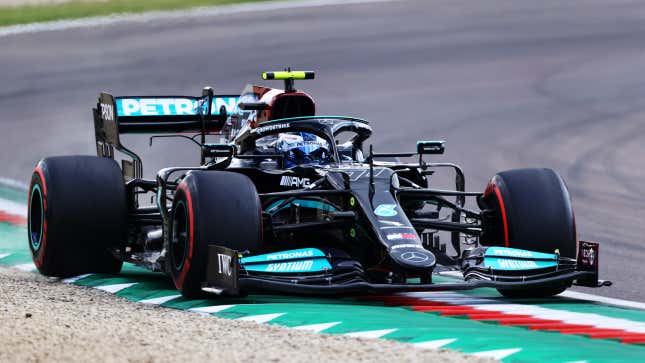
When Valtteri Bottas and George Russell collided at the Emilia Romanga Grand Prix last weekend, it was obvious that it was a bad one. Bits of carbon fiber littered the track and resulted in a red-flag period for clean-up. While neither driver was physically hurt, the teams suffered a big blow where it really hurts: the pocketbook.
Mercedes found that, after taking apart Bottass’ car, repairs would cost around one million pounds, or about $1.39 million, Motorsport.com reports.
In a normal year, that wouldn’t be significant. The Mercedes F1 team is one of the most well-funded teams on the grid; it has found its success through its ability to spend more money than its competition. That’s all well and good. But not when cost caps are involved.
If you missed it, F1 is starting to cap developmental costs, which means you can only spend so much money on building your car this year. $145 million, in fact. And it’s not just building that car—that budget also takes into consideration what it costs to run and repair your car this year, as well as develop your car for next year.
Teams have responded to this challenge in different ways, many of which required a complete rethink about the way they operate. No longer can you just throw a bunch of dollar bills at the wall and see what sticks. You have to consciously plan and hope for the best.
Here’s more from the Motorsport article:
And a big element of that cost saving is making and using fewer parts across the season. Where possible bits have been redesigned to last longer and complete more race weekends.
Indeed, Mercedes quietly introduced more steel and thus less carbon into the suspension of the W12 purely for cost reasons - the change has added some weight, but it gives the parts a longer life.
The team also repurposed its W11 chassis as W12s instead of building a run of new examples – for the record Bottas crashed 05.
So having a massive crash like Bottas’ is a kick in the teeth. Suddenly, you’re left basically refurbishing a chassis from the ground up in order to repair all the damage that took place—something you probably didn’t budget for.
The entire Motorsport article really delves into the way other teams are struggling, too, but it’s really interesting to note the way this process is likely to play into future races. Imola was obviously a bad weekend for Mercedes, but the repercussions could ripple through later races as the team struggles to find cost-effective ways to stay at the front of the grid (something that has already proved to be a struggle for Mercedes).
From a fan's perspective, it's likely to provide a fascinating fluctuation in performance from different teams throughout the season. But it makes sense that manufacturers like Mercedes will be left ruing one bad weekend.